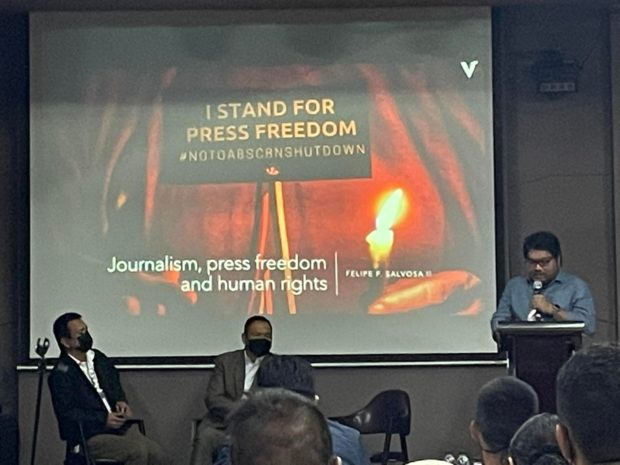
A panel of speakers from the media, military and human rights advocates tackle press freedom and media safety in a dialogue in Clark Freeport on Thursday. (Photo by Tonette Orejas)
CLARK FREEPORT, Pampanga —The Asian Institute of Journalism and Communication (AJIC) and International Media Support (IMS) began here on Thursday (August 25) an in-person dialogue between the media and military on the Philippine Plan of Action on the Safety of Journalists (PPASJ).
The learning exchange, funded by the European Union, drew 29 state agents and seven journalists.
“We obviously need to bring down the numbers (of media killings and attacks) to zero,” said Roby Alampay, IMS Asia regional adviser.
A total of 165 Filipino journalists have been killed since 1986, including the 32 massacred in Ampatuan, Maguindanao in 2009, according to a PPASJ manual, citing the database of the Center for Media Freedom and Responsibility. It also cited 85 attacks and threats recorded from 2016 to 2018.
Many groups from the media, government, civil society, education, and business sectors crafted the PPASJ through regional consultations and focus group discussions. Published in 2019, the PPASJ “adhered to the spirit and intent” of the United Nations Plan of Action on the Safety of Journalists and the Issue of Impunity,” which was launched in 2012.
The PPASJ’s priority areas for national action are integrity and professionalism, conducive working conditions, safety and protection mechanisms, the criminal justice system, public information, journalism education, and research.
The learning exchanges were held online during the pandemic, which led to the creation of a quick alert system on media safety.
In Thursday’s dialogue, resource persons from the Commission on Human Rights, Armed Forces of the Philippines, Philippine Center for Investigative Journalism, Philippine Alliance of Human Rights Advocates and United Nations Educational, Scientific and Cultural Organization (Unesco) tackled policies and guarantees for human rights, freedom of expression and press freedom.
Brig. Gen. Joel Alejandro Nacnac, director of the AFP’s Center for Law for Armed Conflict, said the AFP’s “attitude to the media is [that they are] partners” and assured that accountability mechanics in the AFP are “very strong.”
Regular dialogues between the media and state agents are helpful to implement the PPASJ, according to Felipe Salvosa II of PCIJ.
Citing cases, women journalists were shown to be more vulnerable to attacks and discrimination, according to Unesco officer Rowena Paraan.